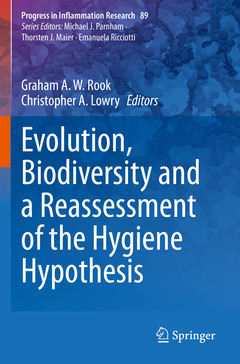Evolution, Biodiversity and a Reassessment of the Hygiene Hypothesis, 1st ed. 2022 Progress in Inflammation Research Series, Vol. 89
Coordonnateurs : Rook Graham A. W., Lowry Christopher A.

This edited collection of 12 chapters by research workers from a wide range of disciplines resolves the confusion that currently surrounds the ?hygiene hypothesis? by considering the human need for exposure to microorganisms from an evolutionary point of view. The book explains why we evolved a requirement for exposure to microbiota from our mothers, from other people, and from the natural environment. It also explains the physiological roles of these exposures, what goes wrong when the exposures are distorted and how human lifestyles and activities, including degradation of the natural environment, are leading to this distortion. Particular attention is given to the range of pathologies associated with inappropriate microbial exposures and inappropriate colonization, including immunoregulatory problems such as allergies and autoimmunity, metabolic problems such as obesity and diabetes, and problems of central nervous system function and neurodegeneration. This book is of profound relevance to most medical disciplines, but also to those concerned with preserving the natural environment and with developing healthier urbanisation.
Christopher A. Lowry, Ph.D. is an Associate Professor in the Department of Integrative Physiology, Center for Neuroscience, and Center for Microbial Exploration at the University of Colorado Boulder, with a secondary appointment in the Department of Physical Medicine and Rehabilitation (PM&R) and Center for Neuroscience, University of Colorado Anschutz Medical Campus, a Principal Investigator in the Department of Veterans Affairs Eastern Colorado Health Care System, VA Rocky Mountain Mental Illness Research, Education, & Clinical Center (MIRECC), director of the Behavioral Neuroendocrinology Laboratory at CU Boulder, Co-Director of the Military and Veteran Microbiome Consortium for Research and Education (MVM-CoRE), Senior Fellow and member of the Board of Directors of inVIVO Planetary Health, of the Worldwide Universities Network (WUN), and a member of the Board of Directors of Trails Please Fou
Explains why we evolved a need for exposure to the microbiota of our mothers and of the natural environment
Summarises the physiological roles of these microbial exposures, and what goes wrong when they are missing
Resolves the confusion in the media and medical literature caused by narrow understanding of the hygiene hypothesis
Date de parution : 03-2023
Ouvrage de 414 p.
15.5x23.5 cm
Date de parution : 03-2022
Ouvrage de 414 p.
15.5x23.5 cm
